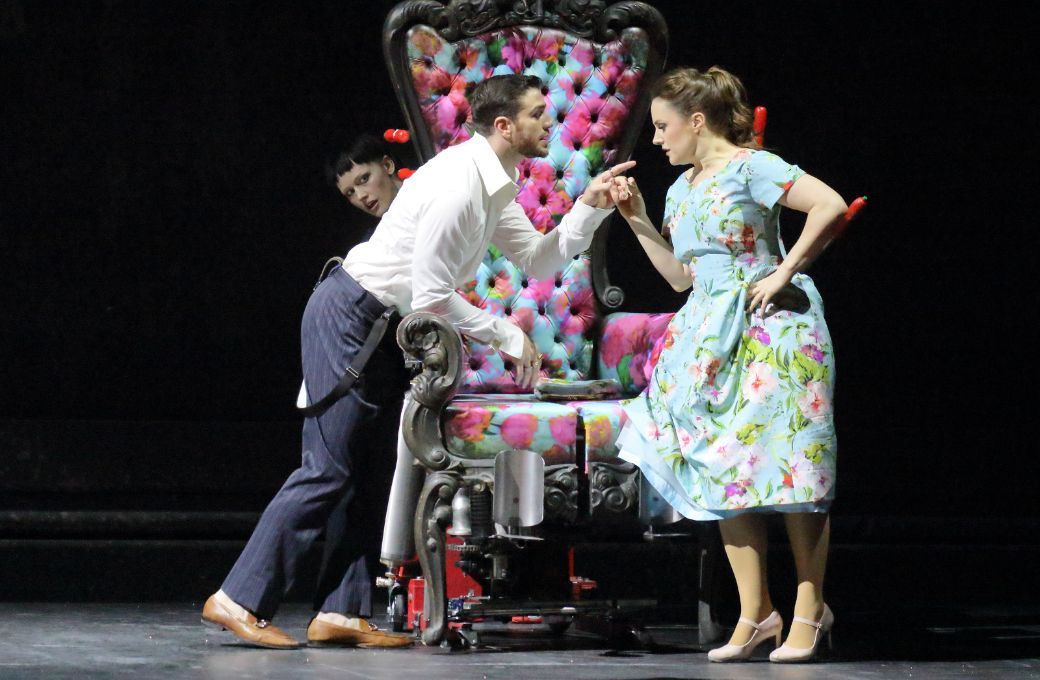Evgeny Titov's Le nozze di Figaro, the second installment in Munich's new Mozart-Da Ponte cycle, is three hours of rollicking good fun – if you don't want to think too hard about the work, or even the staging itself.
Although in interviews Titov was committed to focus on the abuses of power depicted in Nozze, his staging leans harder into the comical than the political. Abounding in gags, the production milks every potentially humorous moment for maximum effect, and this folle journée is indeed wickedly funny, thanks to the comic chops and perfect ensemble spirit of its cast: the Act 2 finale left me bursting out with laughter.
The constant quest for entertainment, however, makes the staging get in its own way, the comedy formulating on a scene by scene basis rather than as a part of an organically built whole. Turning the Count into a drug baron (like a lighter-hearted little brother to Martin Kusej's Salzburg mafioso setting) functions mostly as an excuse for smoking joints, while the oversexed behaviour of multiple figures and the inclusion of BDSM/fetish gear serves only to be the basis of raunchy jokes, missing a well-placed opportunity for examining sexual aggression and exploitation as an instrument of control. The staging even seems to be primed for it – Susanna's dismay in the opening scene is primarily addressed to the fact that their new room also pointedly houses the Count's sex toys.
To be sure, there are nice touches too: Figaro's reunion with his parents is a genuinely sweet, moving moment. Annemarie Woods' costume design is lively and memorable (especially the Count's pink silk tuxedo, later coupled with a chest harness), and the sets, if mostly a static backdrop, paint the pecking order of the Almaviva household with a flourish, from the dilapidated chambers of Figaro and Susanna, to the wood-panelled room of the Count, the elegance only half hiding the rot beneath. This surface-level flashiness, though, is characteristic of the staging as a whole: very amusing to look at, but little of serious worth underneath to admire.
With expectations duly adjusted for what this staging would and would not deliver, the performance was a delight. At the helm, Stefano Montanari brought his customary rapid tempi and eccentric fortepiano-playing to the game, well-serving to establish the exuberant spirit of the show. He led the orchestra in a carefully accentuated, witty performance, bursting with energy.
In an altogether excellent cast, Louise Alder's Susanna proved the crown jewel, with every last note and gesture of her role highly expressive and perfectly rendered. Alder's dulcet-toned, full-bodied lyric soprano is a magnificent instrument and a delight to hear: “Deh, vieni, non tardar”, at once tender and sensual, was nothing short of enchanting. As her Figaro, Konstantin Krimmel was a touch light in volume, but impressed with masterful vocal colouring and an animated stage presence.
The Almavivas had to contend with a shakeup: Diana Damrau was a jump-in for the sadly indisposed Maria Bengtsson. It can thus be forgiven if “Porgi, amor” was a touch unsure, beset with an unsteady vibrato; Damrau soon revealed herself as a highly touching actress and a commanding singer. A musical highlight and a testament to the sensitive, harmonious relationship between stage and pit, “E Susanna non vien” was phrased with startling spontaneity, and “Dove sono” proved spellbinding in its bittersweet clarity.

Mattia Olivieri's Count, a bored playboy prowling the stage like a panther, equal parts petulant and horny, was a riot, more than living up to the staging's demands of physical comedy. Olivieri's smooth, sonorous baritone was well-suited to the figure: “Vedrò, mentr'io sospiro”, bristling with rage, was dispatched with impressive ease, and he chewed every word of his recitatives with clear delight, drawing a vibrant vocal portrayal of his role.
Avery Amereau was a superb Cherubino, ever charming without being overwrought. “Voi che sapete”, gently spun as if a single, endless line, was simply enthralling, a clear sign of great future promise. Rounding off the cast, Nozze veteran Dorothea Röschmann was in formidable vocal shape as Marcellina, tearing up the stage with immense glee. Willard White's Bartolo didn't quite pack the same punch, but made a respectable contribution nonetheless. Eirin Rogderud was a lovely Barbarina, and tenor Tansel Akzeybek and Kevin Conners delivered reliably as Don Basilio and Don Curzio. Whether revival casts will be able to function quite so well remains to be seen, but this one delivered with aplomb.


